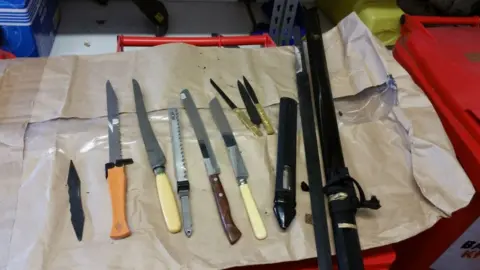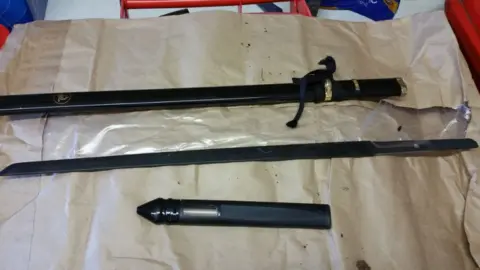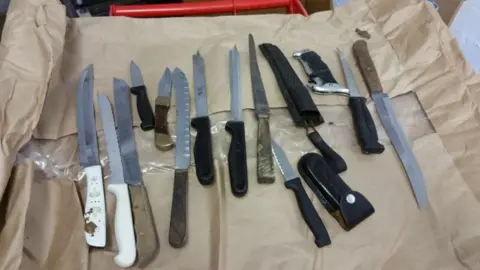County lines and youth cuts blamed as knife crime rises
 Gwent Police
Gwent PoliceKnife crime in Wales increased by 25% in the space of a year according to the latest figures from police forces.
There were 1,228 knife crimes - which is any crime which involved the use of a blade - from July 2017 to June 2018 - up from 986.
Youth workers have said cuts in services for young people and the growth in "county lines" drugs networks are to blame.
Police forces said they are working to develop an action plan across Wales.
Knife crime increased by 11% in England over the same period, according to the Office for National Statistics.
One teenager from Cardiff, who has not been named, said he had seen children as young as 12 carrying knives.
"They're little kids. They don't understand that if you get caught with a blade like you will be doing like three years in jail. It's long," he said.
"They don't know in the same way, if you stab someone with that blade you'll be doing 25 [years in prison]. It's mad.
"I've seen people with kitchen knives, rambos, hunting knives, samurai swords, machetes, anything with a blade really.
"No one's trying to fist fight nowadays so it's whoever's got the longest blade."
Police have previously said that gangs from cities such as London, Liverpool and Manchester have established bases in Welsh towns, using locals to sell drugs on their behalf.
They said young people were being coerced, groomed and threatened by criminals.
 Gwent Police
Gwent PoliceSouth Wales Police, which covers Cardiff, saw the largest rise in knife crime in the last year, with a 43% increase.
Youth workers say the growth in knife crime reflects a worrying trend of young people feeling under pressure to carry knives for protection.
Dr Abdul Azim Ahmed, from the Ethnic Youth Support Team, said it was becoming "more common" for young people carrying knives, mostly because they were "afraid of other people".
"There are two elements of knife-related crime: there are those who carry knives for violent attacks and there are those who carry them to defend themselves because they feel like it's something that they need," he said.
"The two together create a very toxic culture and unfortunately that's what we're coming to in Cardiff."
 Gwent Police
Gwent PoliceKnife crime coordinator Scott Horler from Media Academy Cardiff - which works with young people whom are not in school or training - said there was a number of reasons for the increase, including the county lines drugs network.
"These young people have been exploited in terms of county lines gangs and they feel they need to arm themselves to protect the work they are doing for these dangerous people or dangerous gangs," he said.
"Youth centres, youth clubs have been taken away; these young people then hang about on the streets where anti-social behaviour will take place.
"The perception, according to young people, is that other young people are arming themselves with weapons, knives, so how are they going to protect themselves, which is by arming themselves."
A survey of 13,000 young people in Cardiff by the Youth Parliament found knife crime was the issue which most concerned young people.
Jeremy Vaughan, assistant chief constable at South Wales Police, said: "Knife crime has risen across the country, and we are not an exception to that.
"This is not a one-size-fits-all tactic, but something that will ensure each area takes a specific, targeted and intelligence-led approach to tackling and responding to the needs of their respective communities."
About 170 blades were surrendered during a week long amnesty run by Dyfed-Powys Police earlier this year, including flick knives, kitchen knives and mini swords and daggers
Det Ch Supt Shane Williams said: "I think county lines has probably been in the UK for the best part of five years, and I think during that time we've seen an emergence of that out of the major cities and into some of the rural areas - certainly we've experienced that in parts of Powys, Carmarthenshire and Pembrokeshire. "
See more about this issue on Wales Live, BBC One Wales on Wednesday at 22:35 GMT
